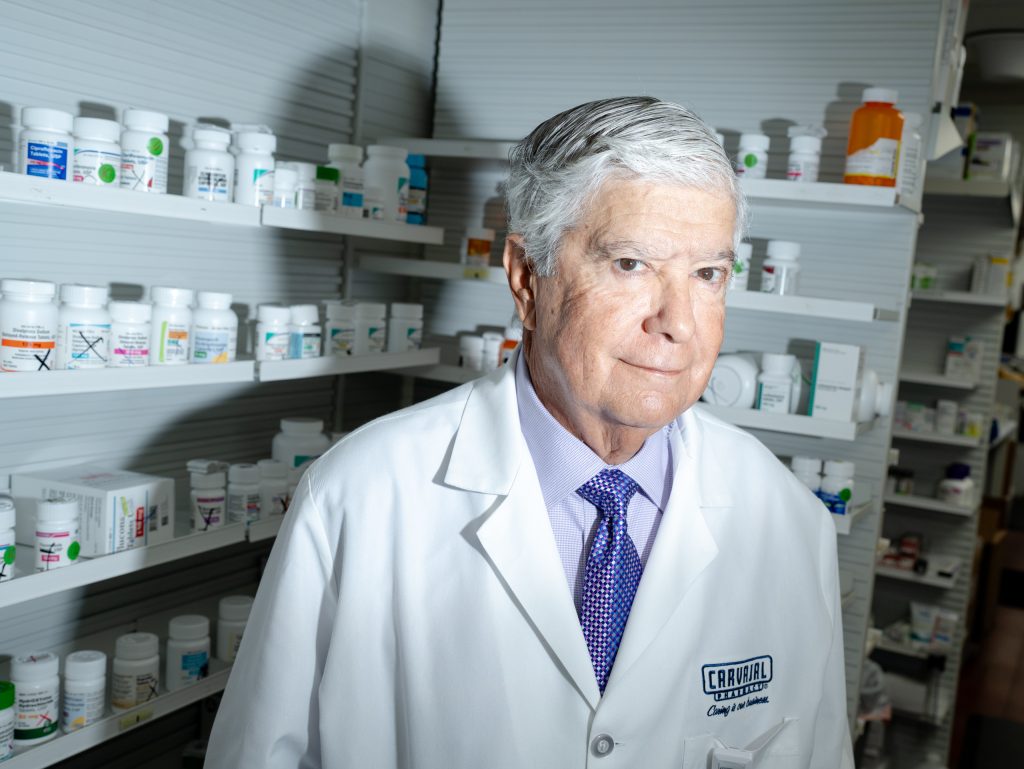But in recent years, staying open has gotten harder for the family, Raymond Carvajal said. He says that’s because pharmacy benefit managers or “PBMs” have been doing their best to drive business away from local small independently owned pharmacies and toward the bigger retail pharmacies.
On Wednesday, Carvajal and his family joined 400 pharmacy professionals who converged in Austin to urge Texas legislators to enact new laws to protect neighborhood pharmacies against PBMs.
Rallying at the state Capitol, these pharmacy professionals also called for PBMs to adhere to existing Texas laws requiring transparent contracts with independent pharmacies and fair compensation for their pharmacy services.
PBMs are third-party administrators who manage prescription drug benefits for health insurers, employers and government programs like Medicaid and Medicare. PBMs act as a middleman between health insurance companies and pharmacies, deciding which medicines are covered by insurance, how much the pharmacy gets paid for them, and sometimes even which pharmacies patients can use.
“Every week, one pharmacy in Texas closes as a result of these PBMs,” Raymond Carvajal said, quoting a report put together by the Texas Pharmacy Association that found that every week for the past two years, Texas has lost an independent pharmacy to closure — often impacting rural communities that depend on these smaller pharmacies.
“It causes strain, not only on the pharmacy independent owners, but … it also impacts our employees,” he added, noting independent pharmacy owners often have to pay their employees less just to stay open and compete in the market.
The rise of PBMs
According to the Journal of the American Medical Association, PBMs started to emerge in the 1950s and 1960s in response to the growing complexity of managing prescription drug benefits.
In the early days of neighborhood pharmacies, insurance companies struggled to keep track of the increasing number of prescriptions being filled. PBMs were created to act as intermediaries between insurers, pharmacies and drug manufacturers.
The rise of PBMs accelerated in the 1990s as health insurance plans began offering prescription drug coverage, and employers increasingly looked for ways to control the cost of health care. During this time, PBMs took on more responsibility, including negotiating drug prices, managing the lists of covered drugs, and processing claims.
However, over time, PBMs grew in influence and control over the pharmaceutical market, leading to some of the issues that plague the U.S. health care system today. While there are over 66 PBMs, the “big three” — Caremark or CVS Health, Express Scripts or Cigna, and Optum Rx or United Health Group — control about 85% of the market.
“What they’re doing now is [the PMBs] make a profit off of their negotiation with the manufacturers on the price drug,” Carvajal said.
Carvajal Pharmacy on Roosevelt Avenue is one of six locally owned and operated by the Carvajal family. Credit: Brenda Bazán / San Antonio Report Driving up costs
In a press release issued by the Texas Pharmacy Association on Wednesday, the association pointed to several recent reports that suggest PBMs have increased prescription drug costs for patients and have been the catalyst leading to closures of neighborhood pharmacies.
One such report , published in January by the Federal Trade Commission , found that the Big Three “marked up numerous specialty generic drugs dispensed at their affiliated pharmacies by thousands of percent, and many others by hundreds of percent.” These included “critical drugs used to treat serious diseases and conditions, including cancer, HIV, multiple sclerosis, and pulmonary hypertension.”
The FTC report also states that the big three reimbursed their affiliated pharmacies at a higher rate than unaffiliated pharmacies on nearly every specialty generic drug examined.
A different FTC report published in July states that the big three PBMs “wield enormous power and influence over patients’ access to drugs and the prices they pay. This can have dire consequences for Americans, with nearly three in 10 surveyed Americans reporting rationing or even skipping doses of their prescribed medicines due to high costs.”
“PBMs decide which medicines patients can get and at what price,” said Texas Pharmacy Association CEO RoxAnn Dominguez. “They dictate lower reimbursement rates for neighborhood pharmacies but then often pay their own pharmacies more. And they decide what employers must pay for a key piece of their employees’ health premiums.”
Proposed changes to state law
The members of the Texas Pharmacy Association are in support of eight bills now pending before the state legislature that would address what they call anti-competitive tactics of PBMs.
The first of these, Senate Bill 1236 and its companion bill House Bill 3317 , would require contract fairness and transparency from PBMs, ensuring PBMs are staying in compliance with existing state laws, and prohibiting unfair fees.
Senate Bill 1354 and its companion House Bill 2978 , seek to prohibit below-cost reimbursements and require an appeal process for reimbursement errors. This would help protect independent pharmacies from PBMs by ensuring that pharmacies are paid a fair amount for the medications they dispense.
Senate Bill 1122 and House Bill 5102 seek to ensure PBM reforms apply to all Texas residents and all PBMs in Texas.
Senate Bill 493 aims to ensure contracts between PBMs, health plans and pharmacies do not limit pharmacists’ ability to inform patients if their prescriptions would cost less when paying the cash price.
And House Bill 4533 would require a transparent reimbursement methodology for prescription drugs dispensed in Medicaid and state-funded programs.
“We’re hoping that they implement these,” Carvajal told the Report. “It’s going to take a year, maybe a little more, but at least you’ll start lowering the cost of medications.”
These laws should also impact how hard neighborhood pharmacies are hit by the PBMs’ anti-competitive, anti-consumer practices, Dominguez said.
“Year after year, we read the disturbing roll call of Texas pharmacies that had to close their doors because they were unable to survive amid PBMs’ anti-competitive tactics,” Dominguez said. “Our neighborhood pharmacies are small businesses that support their communities. Every time one closes, we lose jobs and tax dollars as well as a vital health resource.”








